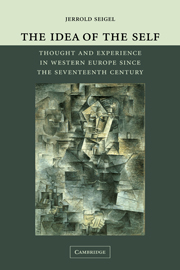Book contents
- Frontmatter
- Contents
- Acknowledgments
- PART I INTRODUCTORY
- PART II BRITISH MODERNITY
- PART III SOCIETY AND SELF-KNOWLEDGE: FRANCE FROM OLD REGIME TO RESTORATION
- 6 Sensationalism, reflection, and inner freedom: Condillac and Diderot
- 7 Wholeness, withdrawal, and self-revelation: Rousseau
- 8 Reflectivity, sense-experience, and the perils of social life: Maine de Biran and Constant
- PART IV THE WORLD AND THE SELF IN GERMAN IDEALISM
- PART V MODERN VISIONS AND ILLUSIONS
- Notes
- Index
8 - Reflectivity, sense-experience, and the perils of social life: Maine de Biran and Constant
Published online by Cambridge University Press: 05 June 2012
- Frontmatter
- Contents
- Acknowledgments
- PART I INTRODUCTORY
- PART II BRITISH MODERNITY
- PART III SOCIETY AND SELF-KNOWLEDGE: FRANCE FROM OLD REGIME TO RESTORATION
- 6 Sensationalism, reflection, and inner freedom: Condillac and Diderot
- 7 Wholeness, withdrawal, and self-revelation: Rousseau
- 8 Reflectivity, sense-experience, and the perils of social life: Maine de Biran and Constant
- PART IV THE WORLD AND THE SELF IN GERMAN IDEALISM
- PART V MODERN VISIONS AND ILLUSIONS
- Notes
- Index
Summary
It was France that experienced the deepest and most concentrated historical upheaval known to Europeans before the twentieth century, the Great Revolution that broke out in 1789. In the years that followed the country was transformed and divided, becoming first a republic and then, after the turn of the century, a new kind of empire under Napoleon, before returning to monarchy in the Bourbon Restoration of 1815. At once destructive and creative, the Revolution left a deep and lasting mark on French and European life, permanently altering conditions and expectations wherever its influence was felt. Yet even so great a disturbance seldom if ever effects a totally new beginning (despite the hopes some cherished for it) and it did not take long for observers to identify elements of persistence between the Old Regime and the new one that replaced it. The most famous (but not the first) proponent of continuity between the Revolution and earlier French life was the historian and political theorist Alexis de Tocqueville, who insisted that such typically revolutionary outcomes as political centralization, the undermining of tradition, and the eventual turn away from civic participation toward the concerns of private life had been prominent features of government and society under the old monarchy. To look into the impact the Revolution and its aftermath had on the ways selfhood was conceived and experienced is to find both signs of radical disruption and indications that certain ideas and situations endured across the great divide.
- Type
- Chapter
- Information
- The Idea of the SelfThought and Experience in Western Europe since the Seventeenth Century, pp. 248 - 292Publisher: Cambridge University PressPrint publication year: 2005

